
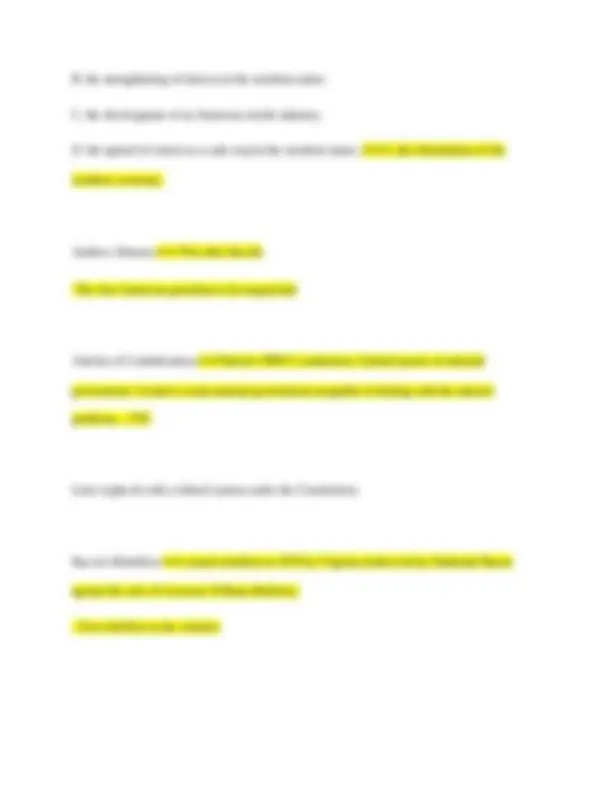
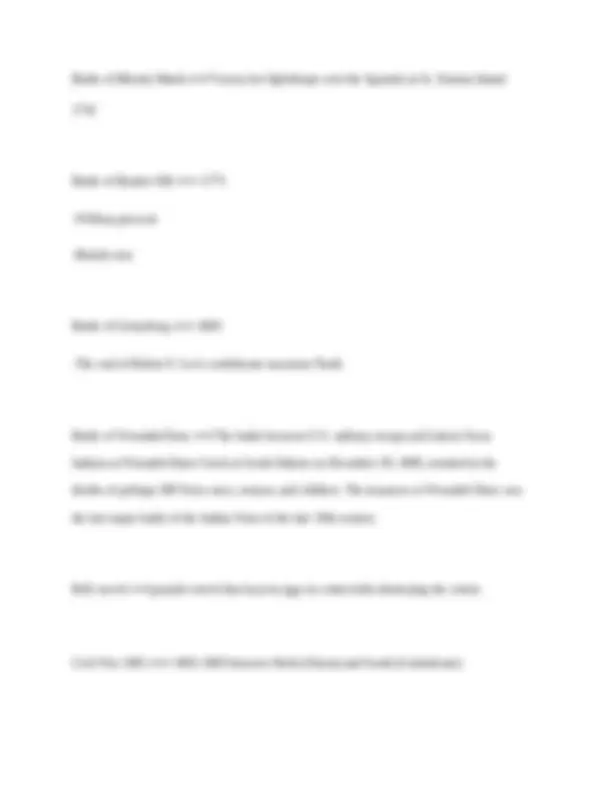
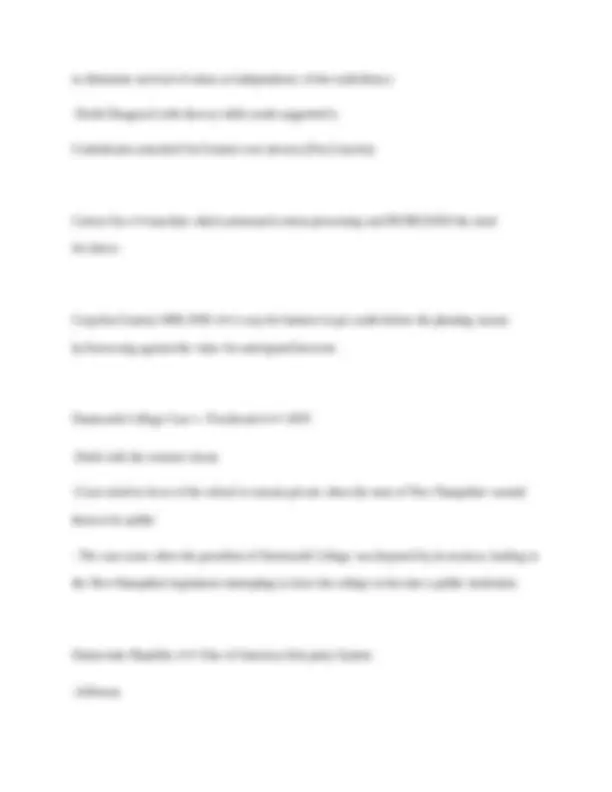
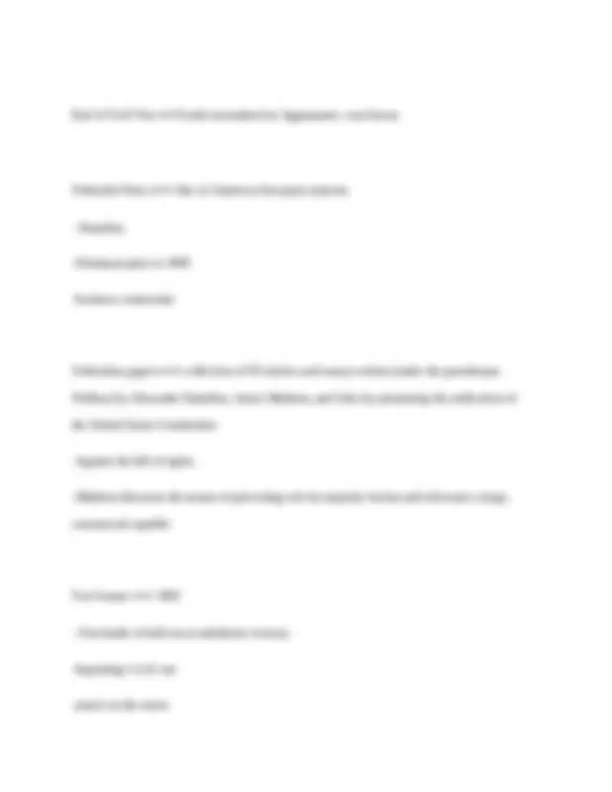
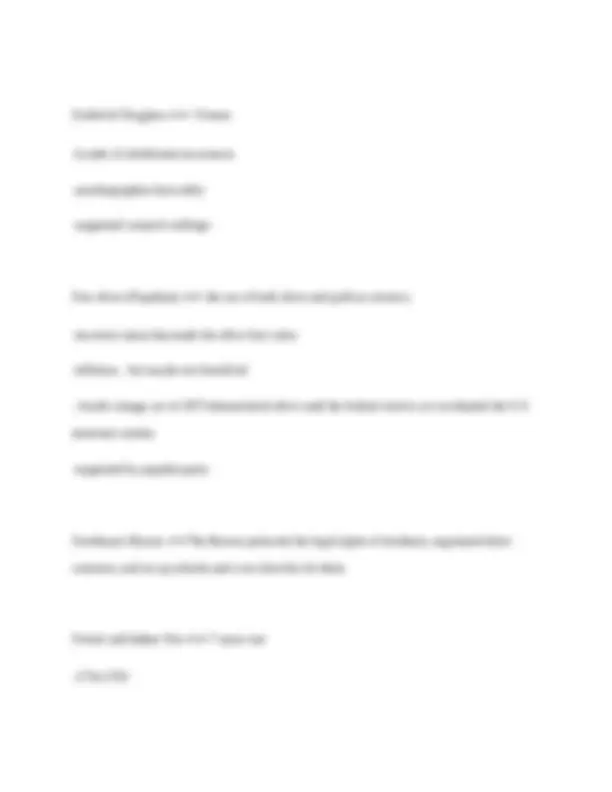
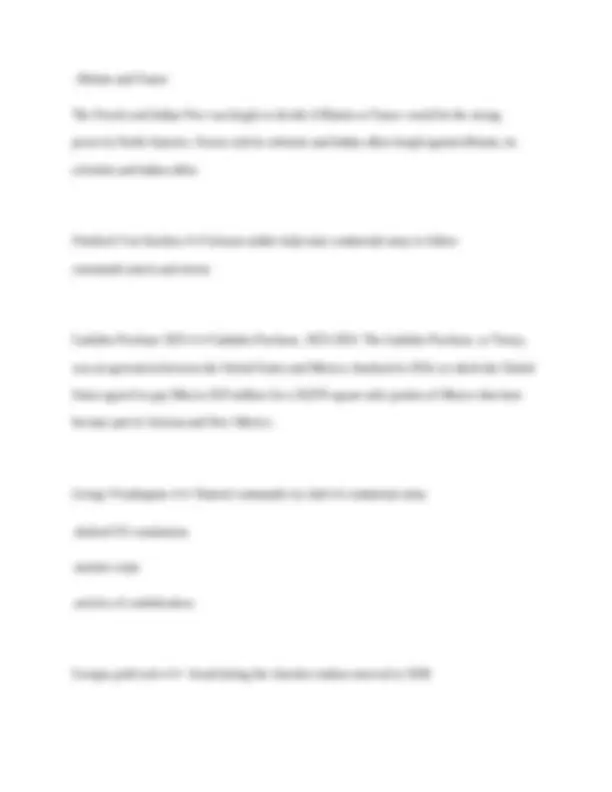
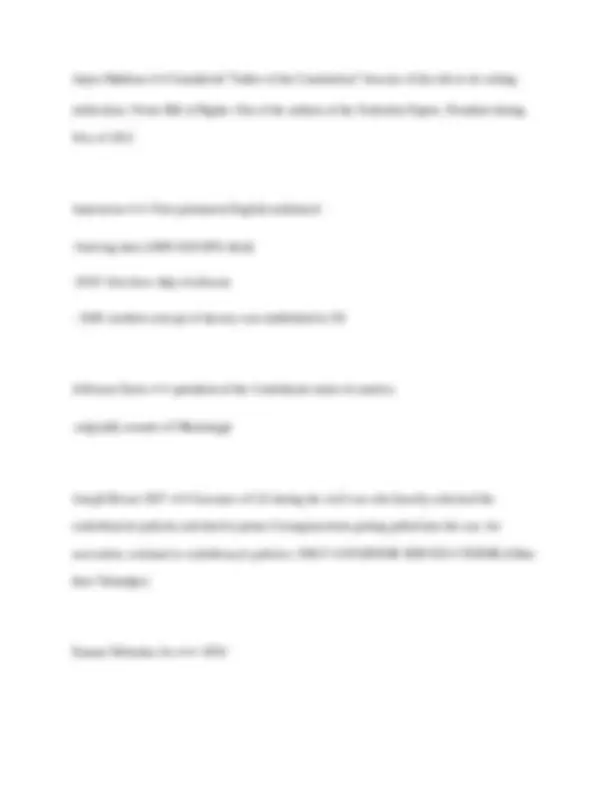
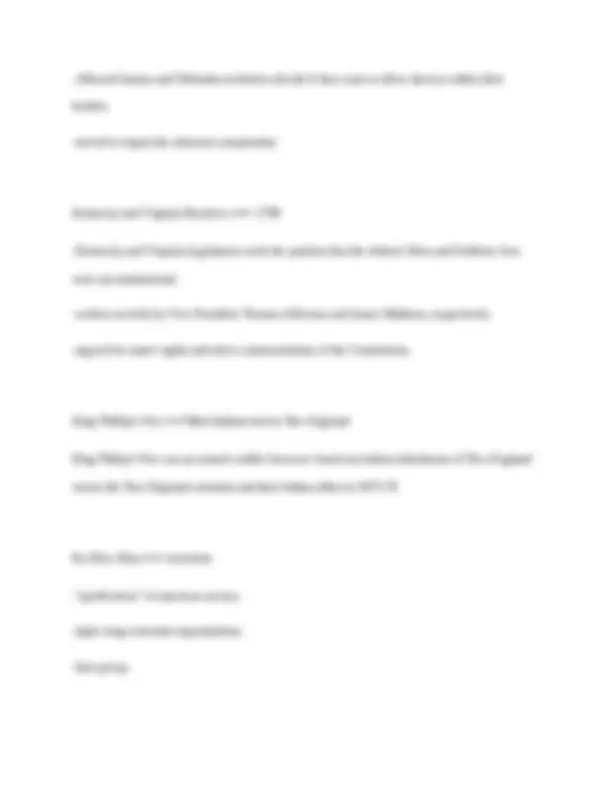
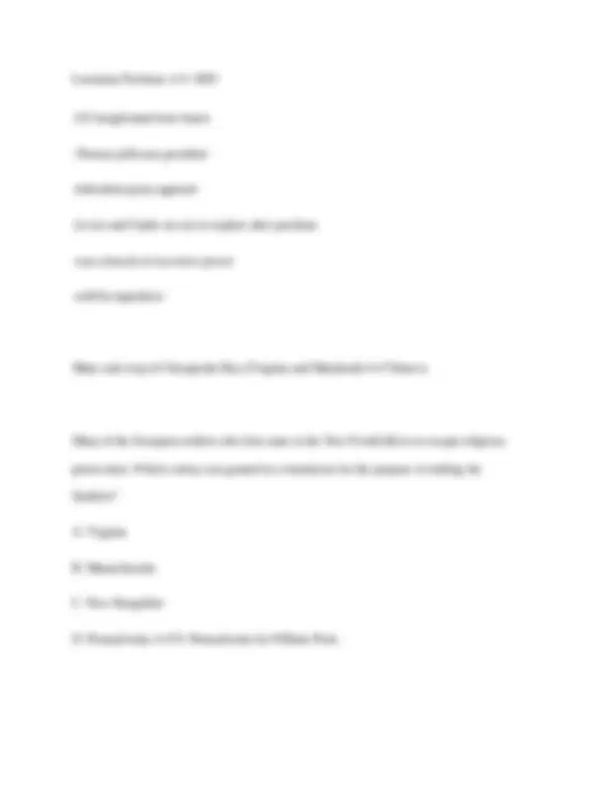
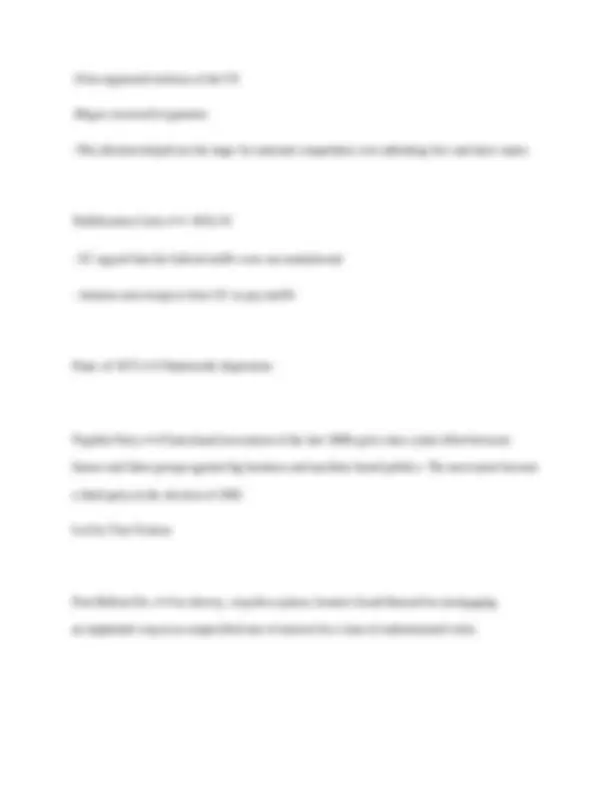


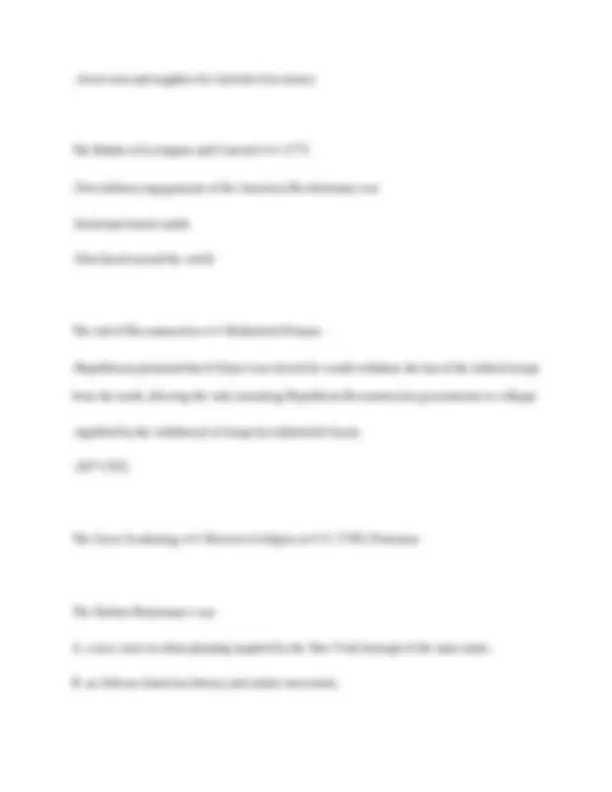
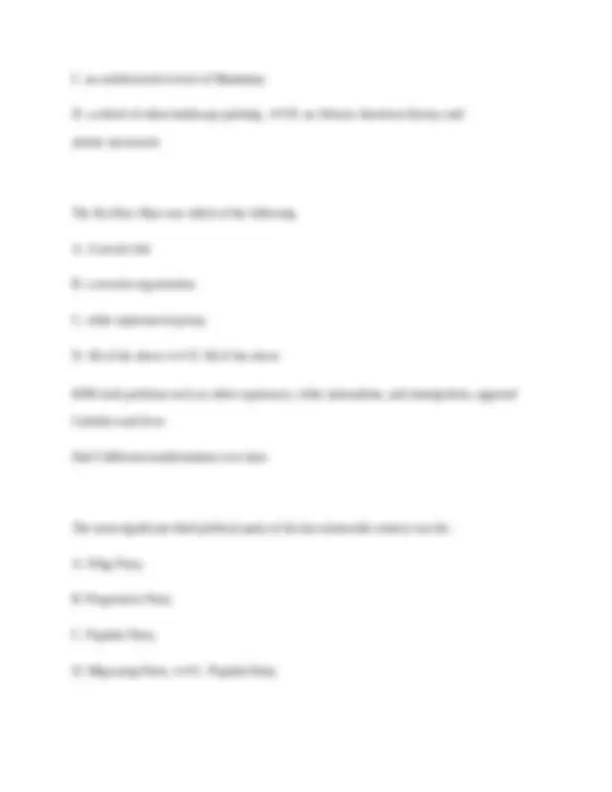
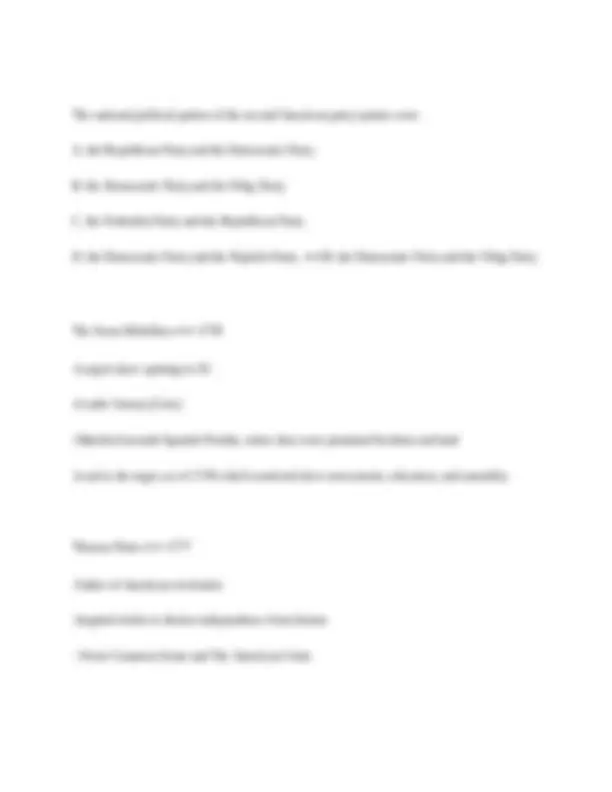
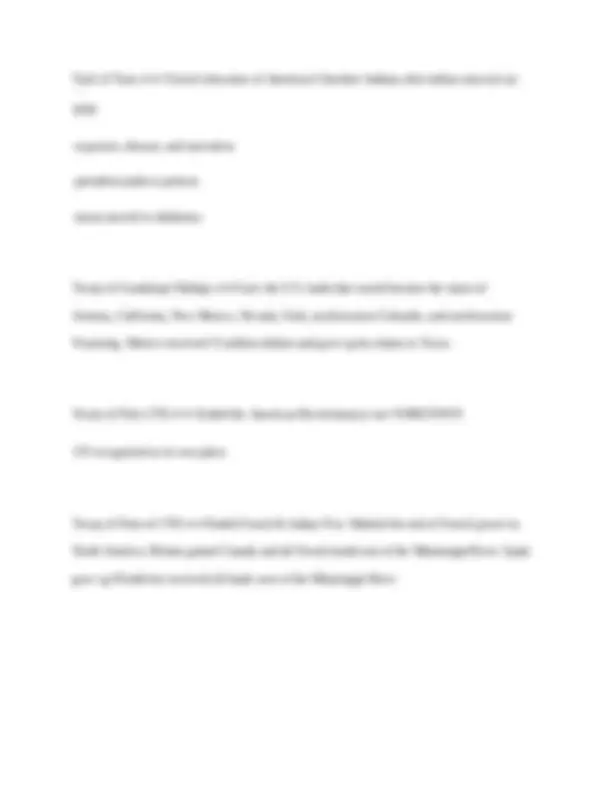
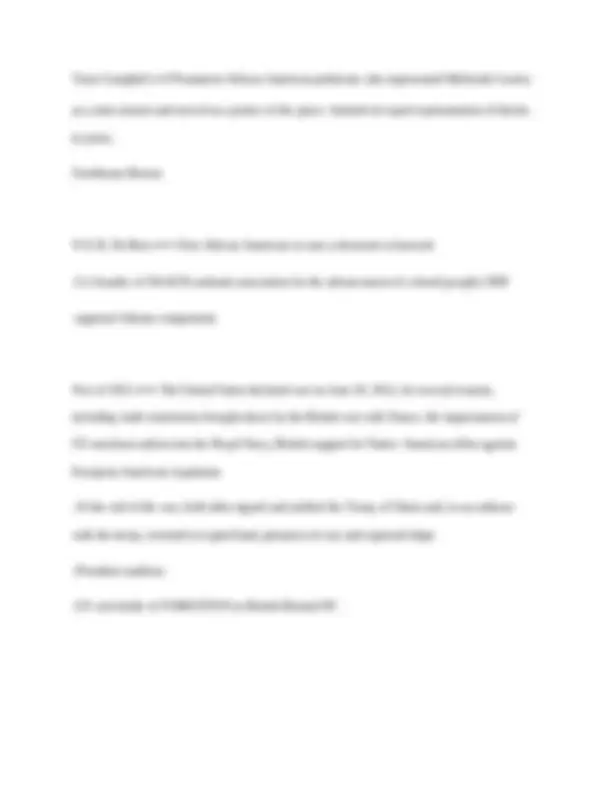
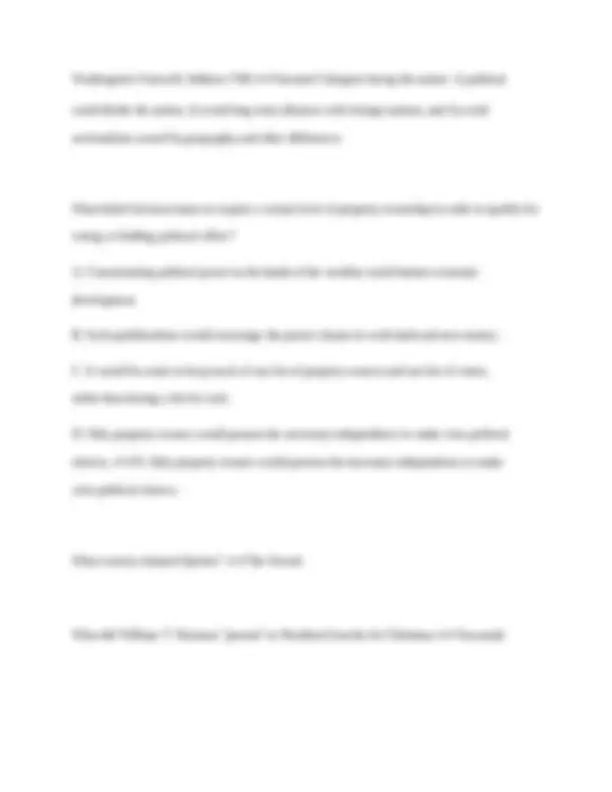

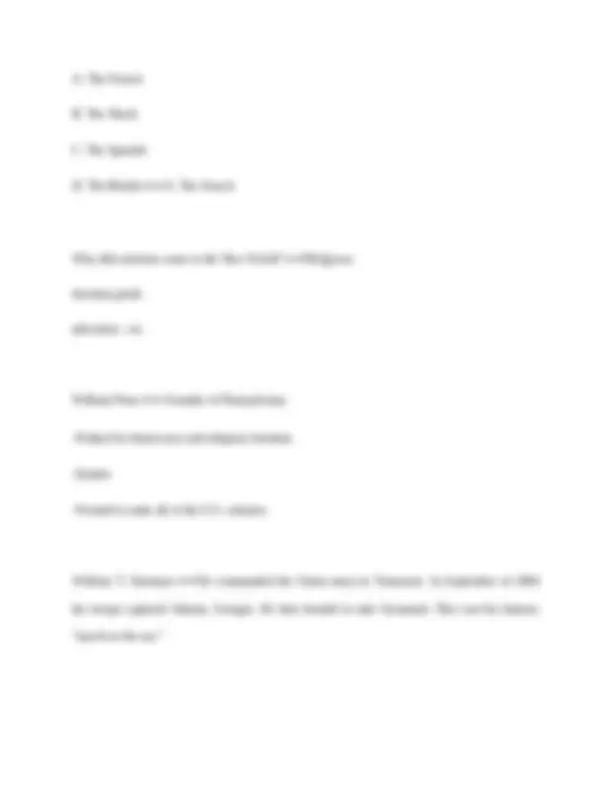


Study with the several resources on Docsity

Earn points by helping other students or get them with a premium plan


Prepare for your exams
Study with the several resources on Docsity

Earn points to download
Earn points by helping other students or get them with a premium plan
Community
Ask the community for help and clear up your study doubts
Discover the best universities in your country according to Docsity users
Free resources
Download our free guides on studying techniques, anxiety management strategies, and thesis advice from Docsity tutors
UGA History Exemption Test Pre-1877 latest update 2024/2025
Typology: Exams
1 / 28

This page cannot be seen from the preview
Don't miss anything!





















??? Early settlers wanted main crop to be , ended up being ✔✔wine/silk and rice/indigo Later cash crops became tobacco and cotton 13th Amendment ✔✔officially abolished and continues to prohibit slavery and involuntary servitude; 1864 14th Amendment ✔✔overruled Dred Scott(1857) granting blacks citizenship ; reinforced due process and equal rights; 1868 15th Amendment ✔✔explicitly grants right of citizens to vote regardless of race, color or having been enslaved ; 1870 460,000 ✔✔Number of slaves freed during and after the war
1795 Yazoo Land Fraud ✔✔in which four land companies bribed legislators to approve their acquisition of 35 million acres (nearly 60 percent of the land area that now constitutes Alabama and Mississippi) at the cost of only five hundred thousand dollars. 1847 Mormon Trail ✔✔Mormons went to Utah Alexander Hamilton ✔✔-One of the Founding fathers -Aided George washington *First US treasurer -one of the most influential interpreters and promoters of the U.S. Constitution, -the founder of the nation's financial system, -the founder of the Federalist Party, -the world's first voter-based political party, -the Father of the United States Coast Guard, and the founder of The New York Post. Alexander Stephens ✔✔VP of Confederate states of America during civil war All of the following were consequences of Eli Whitney's invention of the cotton gin, except: A. the urbanization of the southern economy.
Battle of Bloody Marsh ✔✔Victory for Oglethorpe over the Spanish on St. Simons Island in 1742 Battle of Bunker Hill ✔✔- -William prescott -British won Battle of Gettysburg ✔✔- -The end of Robert E. Lee's confederate incursion North Battle of Wounded Knee ✔✔The battle between U.S. military troops and Lakota Sioux Indians at Wounded Knee Creek in South Dakota on December 29, 1890, resulted in the deaths of perhaps 300 Sioux men, women, and children. The massacre at Wounded Knee was the last major battle of the Indian Wars of the late 19th century. Boll weevil ✔✔grayish weevil that lays its eggs in cotton bolls destroying the cotton Civil War 1861 ✔✔-1861-1865 between North (Union) and South (Confederate)
to determine survival of union or independence of the confederacy -North Disagreed with slavery while south supported it. Confederates attacked Fort Sumter over slavery (Prez Lincoln) Cotton Gin ✔✔machine which automated cotton processing and INCREASED the need for slaves Crop-lien System 1860-1930 ✔✔a way for farmers to get credit before the planting season by borrowing against the value for anticipated harvests Dartmouth College Case v. Woodward ✔✔- -Dealt with the contract clause -Court ruled in favor of the school to remain private when the state of New Hampshire wanted them to be public
During the Civil War, conscription (people being drafted but could find subs or pay to be exempted) was: A. first instituted by the Union. B. unnecessary. C. overturned in the North by a Supreme Court ruling. D. first instituted by the Confederacy. ✔✔D. first instituted by the Confederacy.....used by both Early settlers in New England depended primarily upon what source of labor? A. their children B. slaves C. indentured servants D. wage laborers ✔✔A. their children Eli Whitney ✔✔Invented the cotton gin, 1793 Emancipation proclamation (1863) ✔✔-lincoln issued during the civil war, which made ending slavery a war goal. -Gettysburg Address - A speech delivered by Abraham Lincoln during the Civil War. Lincoln was speaking at the dedication of a soldiers'
End of Civil War ✔✔South surrendered at Appomattox court house Federalist Party ✔✔-One of Americas first party systems
Great Compromise (1787) ✔✔It retained the bicameral legislature as proposed along with proportional representation of the states in the lower house, but required the upper house to be weighted equally between the states. Hartford Convention ✔✔-1814- -federalists expressed grievances with the war of 1812 -Federalists were upset w 3/5 compromise and required a 2/3 majority in congress for the admission of new states -The convention discussed removing the three-fifths compromise which gave slave states more power in Congress and requiring a two-thirds super majority in Congress for the admission of new states, declarations of war, and laws restricting trade. Hernan Cortes ✔✔Spanish explorer who marched across mexico and conquered the aztecs
James Madison ✔✔Considered "Father of the Constitution" because of his role in its writing and ratification. Wrote Bill of Rights. One of the authors of the Federalist Papers. President during War of 1812 Jamestown ✔✔-First permanent English settlement -Starving time (1609-1610 80% died) -1619: first slave ship of africans
-Allowed kansas and Nebraska territories decide if they want to allow slavery within their borders -served to repeal the missouri compromise Kentucky and Virginia Resolves ✔✔- -Kentucky and Virginia legislatures took the position that the federal Alien and Sedition Acts were unconstitutional. -written secretly by Vice President Thomas Jefferson and James Madison, respectively. -argued for states' rights and strict constructionism of the Constitution. King Phillip's War ✔✔Most Indians lost in New England King Philip's War was an armed conflict between American Indian inhabitants of New England versus the New England colonists and their Indian allies in 1675- Ku Klux Klan ✔✔-terrorism -"purification" of american society -right wing extremist organizations -hate group
Marbury vs. Madison ✔✔Supreme Court case which established the principle of judicial review 1803 Mercantilism ✔✔Economic system to unify and increase the power and wealth of a nation by strict governmental regulations through policies like bullion and favorable balance of trade -Adam Smith was anti-mercantilism Mexican American War 1846 ✔✔War between U.S. and Mexico over territory in the southwest (Texas and Rio Grande). As a result, Mexico ceded all claims north of the Rio Grande which included California, Nevada, Utah, and parts of Colorado, New Mexico, Arizona, Wyoming, Morrill Act of 1862 ✔✔-Act of the U.S. Congress (1862) that provided grants of land to states to finance the establishment of colleges specializing in "agriculture and the mechanic arts." -signed by lincoln -promoted higher education in America Nancy Morgan Hart ✔✔One of the most patriotic women in Georgia, she worked as a spy; she disguised herself as a man and entered British camps trying to gain information; famous for holding six British soldiers (Tories) at gunpoint who tried to pillage her land
New York City Riots ✔✔-riots about men being drafted into war -Lincoln had to send in troops to suppress -Lower class were mad that rich could pay $300 to be exempt from war North Strengths and Weaknesses ✔✔Strengths: -superior leadership in Abraham Lincoln -greater population - 22 million people -military power - a five to two advantage in men who could fight, a navy, war machinery -more factories more money more railroads Weaknesses: -fighting on unfamiliar territory -weak motivation Northwest Ordinance ✔✔- -An Ordinance for the Government of the Territory of the United States, North-West of the River Ohio
Railroads West ✔✔In 1837 engineers for the Western and Atlantic Railroad (a state-sponsored project) staked out a point on a ridge about seven miles east of the Chattahoochee River as the southern end of a rail line they planned to build south from Chattanooga, Tennessee. Reconstruction era ✔✔-1865- the period after the Civil War in the United States when the southern states were reorganized and reintegrated into the Union Revolutionary War ✔✔-1775- The American Revolutionary War, also known as the American War of Independence, was a global war that began as a conflict between Great Britain and her Thirteen Colonies, which declared independence as the United States of America. -Sparked by the Stamp Act against King George the III (1765) -Boston Massacre (1770) -Boston Tea Party (1773) (Sons of Liberty) Second party System ✔✔-1828- -rising levels of voter interest -democratic party lead by andrew Jackson
-Whig party lead by henry clay (national republicans) (Jacksonian era) Segregation ✔✔a social system that provides separate facilities for minority groups Seneca falls convention ✔✔- -a convention to discuss the social, civil, and religious condition and rights of woman Sharecroppers ✔✔1870's Tenant farmers, serfs, who worked the land they did not own for a meager share of the crops South Strengths and Weaknesses ✔✔Strengths: -outstanding military officers